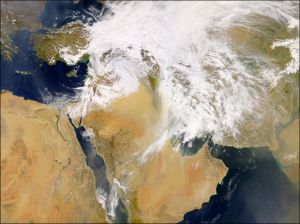“The mullahs of Tehran export an entirely different type of ideology that has led to entirely different worldwide terrorism and instability.”
 Washington, November 20 – Diplomats, politicians, and activists have seized upon last month’s grisly kidnap and murder of a Saudi journalist to argue that the United States must distance itself from the autocratic state that ordered the assassination, and instead mend ties with a rival state that engages in a different cocktail of violent persecution.
Washington, November 20 – Diplomats, politicians, and activists have seized upon last month’s grisly kidnap and murder of a Saudi journalist to argue that the United States must distance itself from the autocratic state that ordered the assassination, and instead mend ties with a rival state that engages in a different cocktail of violent persecution.
Jamal Khashoggi’s death and dismemberment several weeks ago led to a surge of calls to reassess the American strategic relationship with the Kingdom of Saudi Arabia, which oppresses numerous political, religious, and other groups, in favor of improved bilateral relations with theocratic Iran, which oppresses most of the same political, religious, and other groups, albeit with a different overt rationale. Moreover, they contend, Iran has merely had a hand in the deaths of more than 500 American soldiers in Iraq and Afghanistan since 2003.
Saudi Arabia, they argue, either directly persecutes or restricts the behavior and rights of women, non-Muslims, homosexuals, and political dissenters, and the United States must not reward such barbarity with lucrative oil contracts, military sales, or security guarantees. It makes more political and moral sense to engage with the Islamic Republic of Iran instead, which only persecutes or restricts the rights of women, non-Muslims, homosexuals, and political dissenters, justifying such policies in theological terms.
“Saudi Arabia’ export of Wahhabist Islam has led to worldwide terrorism and instability,” noted former Secretary of State John Jerry. “Principle demands that we distance ourselves from such a regime unless and until it changes its ways. A much more appropriate choice of ally would be the mullahs of Tehran, who export an entirely different type of ideology that has led to entirely different worldwide terrorism and instability.”
Kerry cited Iran’s harboring of Al Qaeda terrorists and logistical or financial support for radical groups as evidence the Islamic republic deserves a healthy relationship with the US more than does Saudi Arabia, which has sponsored or shielded a separate set of terrorists and radical groups. “Saudi Arabia has empowered Sunni militias in Syria, for example,” he argued. “Whereas Iran has supported Shiite militias in Syria and Iraq. There’s no comparison.”
Others pointed to Saudi treatment of those within its borders as problematic. “Women only just got permission to drive in Saudi Arabia,” recalled Federica Mogherini, the European Union foreign policy chief. “Contrast that with Iran, which hangs homosexuals from cranes, bans women from attending athletic events, threatens neighbors with nuclear annihilation, and casts opposition as satanic, and you can see why a reassessment of the US-Saudi alliance might be in order.”
Please support our work through Patreon.




